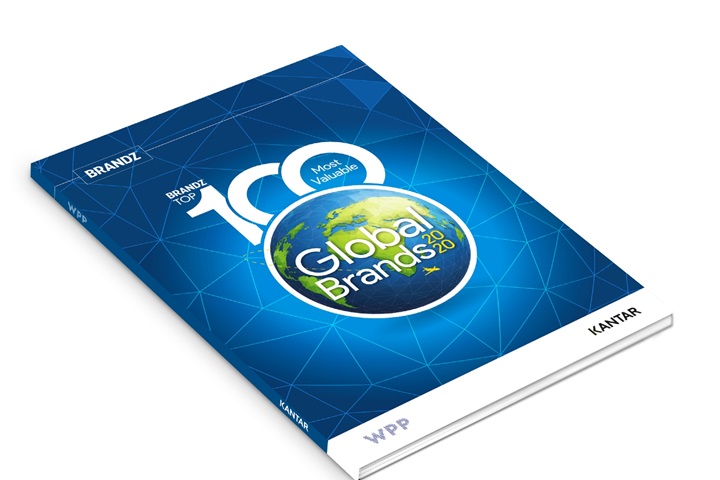The global pandemic has been a pivotal moment for technology brands, helping to boost their brand value, according to the 2020 BrandZTM Top 100 Most Valuable Global Brands ranking. Of the 14 categories ranked, technology was second only to retail in brand value growth, increasing 10% to US$1.8 trillion. When their brand value is combined, consumer and business technology brands account for over a third (37%) of total brand value this year.
The leading brands in the Top 20 Most Valuable Technology Brands 2020 – Apple, (+14%, $352.2bn), Microsoft (+30%, $326.5bn), Google (+5%, $323.6bn) – also dominate the highest level of the BrandZ Top 100 ranking at nos. 2, 3 and 4 respectively. Chinese internet services giant Tencent (+15%, $151bn) and Facebook (-7%, $147.2bn) completed the top five most valuable technology brands and also came in at no.7 and no.8 in the Top 100.
The total brand value of the BrandZ Top 100 global brands reached US$5 trillion, an increase of 5.9%, despite the economic, social and personal impacts of COVID-19. Prior to the global pandemic, total brand value of the Top 100 brands was set to increase by 9%.
Technology brands have proved extremely resilient, especially relative to brands in most other categories, with revenue and profit generally improving, although at a slower pace. The recent crisis has helped reignite the ‘romance’ between consumers and technology brands, which had been cooling off due largely to trust issues around privacy and the protection of personal data. Lockdown has been a stark reminder that technology is indispensable to our lives, and that we are dependent on digital connections and devices to buy food and other essentials, conduct meetings and communicate with family and friends.
Innovation through services drives growth
This year’s BrandZ ranking showed that innovation and creativity are key drivers of growth across all categories. Tech brands have adopted a strategy that has seen them expand from devices into services pursuing both business-to-business (B2B) and consumer opportunities.
Apple’s wearables and services drove revenue gains, while its subscription streaming service, Apple TV+, has taken it into new territory competing with established names Netflix and Amazon Prime, and new players like Disney+. Facebook anticipated that COVID-19 signalled a ‘new normal’ and introduced Messenger Rooms, a chat feature that can accommodate 50 people. Microsoft overtook Google due to a strategic shift to subscription-based services and growth in its workplace ecosystem that incorporates Office365 and Microsoft Teams, allowing people to maintain ‘business as usual’ during lockdown.
B2B technology brands IBM (-3%, $83.7bn), Oracle (+2%, $26.9bn), SAP (0%, $57.6bn) and Cisco (-9%, $26.3bn) continued to develop their services as cloud computing continues to evolve to value-added analytics and cloud-based artificial intelligence. Cloud specialists, including Adobe (29%, $35.9bn) and Salesforce (13%, $30.5bn), reinforced their creative and CRM credentials as part of a multi-cloud, multi-vendor approach.
Privacy and trust
As technology devices and services have become more integral to our lives, this has led to a more intimate relationship between user and brand – and trust is fundamental to this. Privacy issues over recent years relating to the protection and use of personal data, such as the Facebook and Cambridge Analytica example, has led to a breakdown of this trust. Technology brands have had to begin the process of rebuilding this.
Facebook began the process of integrating its WhatsApp, Instagram and Facebook Messenger functions to assert more centralised control over reliability and privacy protection. Apple addressed privacy directly in a Super Bowl ad promoting respect for privacy as an important attribute of the Apple brand, while Google took a different approach in its Super Bowl ad, with an emotional display of how personal data, transformed by AI, can enrich life.
Explore the role that trust plays in your brand’s success, through our new BrandZ Perspectives report on Consumer Trust available via Kantar Marketplace


